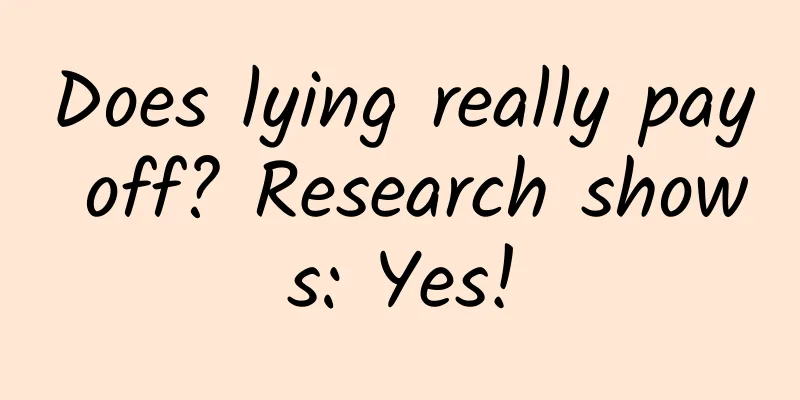Does lying really pay off? Research shows: Yes!

|
A little-known fact: In daily life, people actually tell far more lies than they realize . In the fairy tale, Pinocchio’s nose grew longer after he told a lie. In real life, what will happen if a person tells too many lies? Will he get “retribution”? Psychologists have found in their research that frequent lying does have a negative impact on physical and mental health . You tell more lies than you think. One of the most basic teachings we receive in childhood is to be an honest child and not to lie to others. However, almost no one can really do this. Robert S. Feldman, a psychologist at the University of Massachusetts, conducted a study on lies in 2002. Under a specific experimental scenario and a conversation time limit of 10 minutes, 60% of the participants told at least one lie when talking to each other. Copyright images in the gallery. Reprinting and using them may lead to copyright disputes. In another survey on the frequency of lying among the public, it was found that the average person lies about 4 times a day, and the average number of lies per year is about 1,460 times. Of course, these data are slightly general because they are affected by factors such as age, gender, social class, cultural differences, etc., and do not mean that everyone is a liar. But it does show a problem in life, that is, we are not as honest as we think . What are the motivations for people to lie in their daily lives? The tendency to lie is deeply rooted in human evolution . Anthropologists have observed that other primates also understand the concept of deception. Primatologist Frans de Waal was surprised to find that a chimpanzee named Yeroen would deliberately limp in front of his own kind to gain sympathy and gain an advantage in the competition for food. For humans, we have mastered this deception technique as early as between the ages of two and five, which we use to obtain much-needed survival resources and gain the meticulous care of our parents. It is regarded as an important milestone in our cognitive development . Of course, there are many kinds of lies, and their classification depends on the liar's motives. Some motives are trivial, some are well-intentioned, but some have the ability to bring devastating consequences. Copyright images in the gallery. Reprinting and using them may lead to copyright disputes. In a 2022 study, the experimenters collected a questionnaire about the motivations for lying from 157 participants with an average age of 40. It showed that the main motivations for people to lie include: avoiding negative evaluation, avoiding punishment, self-expression, getting rewards, compulsive lying, careless slips of the tongue, love of deception, maintaining personal mystery, protective lies, pleasing others, and protecting others (altruism) . Does lying often affect our health? The answer may surprise you. Indeed, frequent lying can have a negative impact on your health . As social animals, our personal reputation has irreplaceable significance in the group. Most people are willing to pay any price to maintain a trustworthy and honest image . However, in life, we have many people and things that need to be dealt with by lies, which creates a psychological contradiction. Everyone knows that being caught lying can cause irreparable damage to one's reputation. So, when lying, ordinary people are in a state of heightened alertness, and this stress increases with the importance of the lie. It changes our physiological reactions in the moment, such as sweating, dry mouth, trembling voice, faster breathing and heart rate, etc. Copyright images in the gallery. Reprinting and using them may lead to copyright disputes. In brain imaging studies, scientists have found that the reason why people have these physiological reactions and emotional reactions such as anxiety is not because we are condemned by our conscience, but because lying activates the brain's limbic system, which triggers the "fight or flight" response under stress . When people tell the truth, the activity of the brain's limbic system is minimal. Therefore, telling the truth more often makes us feel relaxed, while lying makes our brain feel stressed . This uneasy feeling after lying is what we often refer to as " condemnation from conscience ". According to a 2015 study, frequent lying can cause additional cardiovascular burden, including high blood pressure, increased heart rate, vasoconstriction, and increased stress hormones in the blood. In addition, lying can also increase the risk of cancer, obesity, anxiety, depression, low job satisfaction, and poor interpersonal relationships. People who love to lie are more likely to fall into the whirlpool of life A study published in the journal Nature Neuroscience in 2016 found that when our brain gradually adapts to deceptive behavior and develops the habit of lying, the physiological and psychological effects mentioned above will gradually weaken. This is why some people can lie without blushing or feeling nervous. But please don't be too happy too soon. Dr. Deirdre Lee Fitzgerald, a professor of psychology at Eastern Connecticut State University, found in her research that people who like to conceal things and tell lies in their daily lives are more likely to fall into some scams in society and cannot extricate themselves , such as telecommunications fraud and pyramid schemes. They are also more inclined to participate in activities that may put themselves in desperate situations, such as gambling, addiction, robbery and other crimes. Copyright images in the gallery. Reprinting and using them may lead to copyright disputes. In fact, the vast majority of people are terrible at lying . Awkward body language, unnatural smiles, distorted facial expressions, and unconvincing thinking logic all show the liar's inner anxiety and panic to the outside world at all times. It is difficult for such people to have close friends , and it is even more difficult for them to gain the positive energy brought by social interaction from daily communication, because they always think about one question: "Is the person opposite me not telling the truth to me?" One lie needs a hundred lies to make up for it, and a perfect "Pinocchio" needs an honest Pinocchio to complete it. Therefore, please try to be honest with others in your daily life. This is not only to protect those we love around us, but also the best way to help ourselves get rid of the troubles brought by the limbic system (conscience) of the brain . References [1]University of MassachusettsAt Amherst. (2002, June 12). UMass Researcher Finds Most People Lie In EverydayConversation. ScienceDaily. Retrieved July 16, 2023from www.sciencedaily.com/releases/2002/06/020611070813.htm [2]Garrett N, Lazzaro SC,Ariely D, Sharot T. The brain adapts to dishonesty. Nat Neurosci.2016;19(12):1727-1732. doi:10.1038/nn.4426 Planning and production Author: Su Yi, deputy director of the National Psychological Service Grassroots Collaboration Network Media Development Center, and a psychotherapist Review | Fan Chunlei Associate Researcher, Institute of Psychology, Chinese Academy of Sciences |
>>: High Entropy Alloys: New Materials Developed from “Chemical Disorder”
Recommend
Detailed explanation of the three major issues of user activity, retention, and loss
Before solving a problem, do you want to understa...
Gastric acid is so strong, why does drinking dirty water cause diarrhea? | Ronggelao Ke
As the leader of biological evolution, many organ...
Will the parallel lines of sadness ever meet one day?
When it comes to parallel lines, everyone is fami...
Do you want to slap a mosquito to death? Dinosaurs may have thought so too
Mosquitoes have a way of ruining our mood every s...
Before the event starts, please warm up the event!
Good "activity preheating + hot spot leverag...
There is a "film" on the surface of the tea. Is it the tea that is dirty or the teacup that is dirty?
Expert of this article: Yang Chao, PhD in Chemist...
Want to install Windows 10? You need to know the following 9 points
Microsoft Windows 8 was controversial after its r...
Qingyu Community "Pinduoduo VIP Member Series" Super Detailed Pinduoduo Practical Operation Strategy
The content of this training course includes 8 sh...
10 tech products that became popular before they were released in 2015
2014 was an exciting year, as we mentioned in our...
Insights: Don’t put your feet into other people’s shoes
Famous Artists Gallery | Lou Shibai, a native of ...
Mo online class C4D crazy dynamics second issue
Course Catalog ├──00 Preparation Week | ├──Prepar...
If you put hot water and cold water in the refrigerator together, which one will freeze first? Bet you will get the answer wrong
A cup of hot water and a cup of cold water, they ...
Thunder and lightning, strong winds, heavy rain and hail will hit many provinces. Why does severe convective weather occur so frequently this year?
Recently, large-scale severe convective weather h...
Microsoft optimizes Teams Shifts app to send shift notifications to designated employees
On August 8, Microsoft officially released a blog...
When taking over a new project, how can we promote it so that it can quickly gain volume?
Let me share with you today: What are the methods...









